 W
WAlexander I of Epirus, also known as Alexander Molossus, was a king of Epirus (343/2–331 BC) of the Aeacid dynasty. As the son of Neoptolemus I and brother of Olympias, Alexander I was an uncle of Alexander the Great. He was also an uncle of Pyrrhus of Epirus.
 W
WArchidamus III, the son of Agesilaus II, was king of Sparta from 360 BC to 338 BC.
 W
WAreus I was Agiad King of Sparta from 309 to 265 BC, who died in battle near Corinth during the Chremonidean War. He was the grandson of Cleomenes II and was succeeded by his son Acrotatus II.
 W
WBrasidas was the most distinguished Spartan officer during the first decade of the Peloponnesian War.
 W
WCallimachus was the Athenian polemarch at the Battle of Marathon which took place during 490 BC. According to Herodotus he was from the Attica deme of Afidnes.
 W
WChabrias was an Athenian general active in the first half of the 4th century BC. During his career he was involved in several battles, both on land and sea. The orator Demosthenes described him as one of the most successful commanders Athens ever had:To sum up the whole: he is the only general who never lost a single city or post or ship or soldier, when he commanded you: none of your enemies has any trophy over you and him, while you have many over many enemies under his command.
 W
WCharitimides was an Athenian admiral of the 5th century BCE. At the time of the Wars of the Delian League, a continuing conflict between the Athenian-led Delian League of Greek city-states and the Achaemenid Empire, he was sent in 460 BCE to Egypt in command of a fleet of triremes to support Inaros II, a Libyan ruler who was leading a revolt against the Achaemenid rule over the country. His fleet had been operating on the coasts of Cyprus, from where he was diverted to Egypt.
 W
WCynegirus or Cynaegirus was an ancient Greek general of Athens and had three siblings. His two brothers were the playwright Aeschylus and Ameinias, hero of the battle of Salamis, while his sister was Philopatho, the mother of the Athenian tragic poet Philokles. He was the son of Euphorion from Eleusis and member of the Eupatridae, the ancient nobility of Attica.
 W
WEpaminondas was a Greek general of Thebes and statesman of the 4th century BC who transformed the Ancient Greek city-state of Thebes, leading it out of Spartan subjugation into a pre-eminent position in Greek politics. In the process he broke Spartan military power with his victory at Leuctra and liberated the Messenian helots, a group of Peloponnesian Greeks who had been enslaved under Spartan rule for some 230 years after being defeated in the Messenian War ending in 600 BC. Epaminondas reshaped the political map of Greece, fragmented old alliances, created new ones, and supervised the construction of entire cities. He was also militarily influential and invented and implemented several major battlefield tactics.
 W
WLeonidas I was a king of the Greek city-state of Sparta, and the 17th of the Agiad line, a dynasty which claimed descent from the mythological demigod Heracles and Cadmus. Leonidas I was son of King Anaxandridas II. He succeeded his half-brother King Cleomenes I to the throne in c. 489 BC. His co-ruler was King Leotychidas. He was succeeded by his son, King Pleistarchus.
 W
WLysander was a Spartan admiral who commanded the Spartan fleet in the Hellespont which defeated the Athenians at Aegospotami in 405 BC. The following year, he was able to force the Athenians to capitulate, bringing the Peloponnesian War to an end. He then played a key role in Sparta's domination of Greece for the next decade until his death at the Battle of Haliartus.
 W
WLysimachus was a Macedonian officer and diadochus of Alexander the Great, who became a basileus ("King") in 306 BC, ruling Thrace, Asia Minor and Macedon.
 W
WPelopidas was an important Theban statesman and general in Greece, instrumental in establishing the mid-fourth century Theban hegemony.